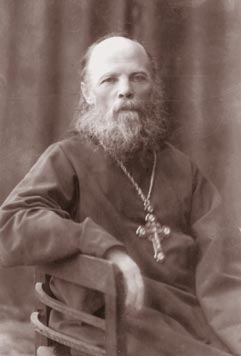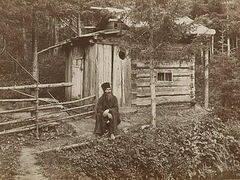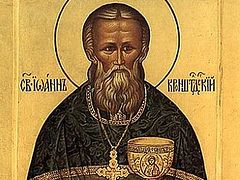 Holy Righteous Alexiy Mechev was born in Moscow on March 17, 1859, into a devout family. His father, Alexei Ivanovich Mechev, was the choir director at the Cathedral of the Chudov Monastery.
Holy Righteous Alexiy Mechev was born in Moscow on March 17, 1859, into a devout family. His father, Alexei Ivanovich Mechev, was the choir director at the Cathedral of the Chudov Monastery.
From birth, the life of Father Alexiy was closely connected to the name of St. Philaret, Metropolitan of Moscow and Kolomna (commemorated November 19). St. Philaret had once saved Alexiy’s father from freezing to death as a child. Seeing in this a manifestation of Divine Providence, the Metropolitan continued to care for the rescued child and later also for his family. When Alexiy was being born—his mother, Alexandra Dmitrievna, was enduring a difficult labor—Metropolitan Philaret prayed together with Alexei Ivanovich for the safe delivery, and foretold, “A boy shall be born; name him Alexiy in honor of St. Alexius, the Man of God, whose feast we celebrate today.”
Alexiy grew up in a home filled with living faith in God, love, and kindness toward others. He studied at the Zaikonospassky School and then at the Moscow Theological Seminary. After graduating, he hoped to enter university and become a physician. However, his mother opposed this plan, wishing instead to see her son become a priest. It was not easy for Alexiy to renounce his dream, but he did not go against the will of his beloved mother. In time, he came to understand that he had found his true calling.
After graduating from the seminary, Alexiy served as a psalm-reader at the Church of the Sign (Znamenskaya) in the Prechistenka district. There he endured a great trial. Besides his service as a reader, the church rector demanded that he also serve as a watchman. He treated him roughly, threatened him with a poker, and even struck him. Yet Alexiy bore it all meekly, never complaining or asking to be transferred. Later, as a priest, he thanked God for allowing him to pass through such a school of humility. When that rector died, Fr. Alexiy came to the funeral service and, to the astonishment of those who knew how he had been treated, followed him to the grave with tears of gratitude and love.
Fr. Alexiy would later say that when people point out our flaws, those we don’t see in ourselves, they help us combat our inner “Yashka.”1 (He spoke of two enemies within us: “Okayashka”2 and “Yashka”—his names for egotism and self-love, that voice which instantly rises up in protest when it feels offended or slighted.) “Such people,” he taught his spiritual children, “must be loved as benefactors.”
On November 18, 1884, he was ordained a deacon and began serving at the Church of the Great Martyr George in Lubyansky Lane. Outwardly, Fr. Alexiy showed the utmost simplicity; inwardly, he burned with zeal for the Lord.
That same year, Alexiy married Anna Petrovna Molchanova, the daughter of a psalm-reader. Their marriage was very happy, though Anna Petrovna suffered from a serious heart condition, and her health became a constant concern for Fr. Alexiy. They had several children: daughters Alexandra (born 1888) and Anna (1890); sons Alexiy (1891), who died in infancy, and Sergei (1892); and their youngest daughter Olga (1896).
On March 19, 1893, Deacon Alexiy Mechev was ordained a priest and assigned to the Church of Saint Nicholas in Klyonniky. The ordination took place at the Zaikonospassky Monastery and was performed by Bishop Nestor, abbot of the Novospassky Monastery in Moscow. The parish of this church was small, surrounded as it was by larger, well-known churches. Although Fr. Alexiy had prepared himself for ministry in a village, after receiving a parish in the capital he surrendered fully to the will of God and began his labors, founding them on prayer and spiritual vigilance.
After establishing daily services in his church, St. Alexiy served for eight years in a nearly empty church, almost alone. In time, those who were sorrowful and burdened with grief began to come, and word spread of the kind priest.
The life of the clergy in small parishes at that time was materially difficult, and domestic conditions were poor. Matushka Anna Petrovna’s illness worsened; she developed dropsy, accompanied by extreme swelling and painful shortness of breath. Her suffering was so great that she began to beg her husband to stop praying for her healing. On August 29, 1902—the feast of the Beheading of the Forerunner and Baptist John—Anna Petrovna reposed.
 Holy Righteous Alexiy Mechev Father Alexiy mourned deeply. He would shut himself in his room and pour out his soul before the Lord. During that time, Holy Righteous John of Kronstadt arrived in Moscow. He had been invited to the home of a merchant family very close to Fr. Alexiy, who joined the Kronstadt pastor in his charitable works. It was in this house that the inconsolable priest met him.
Holy Righteous Alexiy Mechev Father Alexiy mourned deeply. He would shut himself in his room and pour out his soul before the Lord. During that time, Holy Righteous John of Kronstadt arrived in Moscow. He had been invited to the home of a merchant family very close to Fr. Alexiy, who joined the Kronstadt pastor in his charitable works. It was in this house that the inconsolable priest met him.
When Fr. Alexiy Mechev asked, “Have you come to share in my grief?” Fr. John replied, “I have not come to share your grief, but your joy: the Lord is visiting you.” Later, Fr. Alexiy would say, “The Lord visits our heart with sorrows in order to reveal other people’s hearts to us.” St. John counselled him: “Be with the people, enter into others’ grief, take it upon yourself. Then you will see that your own misfortune is small and insignificant compared to the common sorrow, and it will become easier for you.”
The grace of God, which rested abundantly upon the Kronstadt pastor, illumined Fr. Alexiy’s path anew. He received Father John’s exhortation as an obedience placed upon him. His many years of truly ascetic life, entirely devoted to prayer and service to others, had clearly prepared him to receive the gift of eldership. In the words of one spiritual child, he became “a faithful and constant watchman over the sorrowful heart of man.”
Fr. Alexiy met all who sought help at the Church of St. Nicholas in Klyonniky with heartfelt warmth, love, and compassion. Into their souls entered the joy and peace of Christ, and hope for God’s mercy. Their souls would be renewed. The elder’s love gave everyone the feeling of being especially loved, pitied, and consoled. St. Alexiy was filled with love. He did not know the harsh word “punish,” but only the merciful word “forgive.” “The path to salvation,” he would say, “lies in love for God and neighbor.”
He did not lay heavy burdens of obedience on his spiritual children, nor did he demand extraordinary asceticism. At the same time, emphasizing the need for at least some small external effort, he would say that one must weigh his own strength and resolve, and after making that decision, fulfill it no matter what. Endowed with the grace-filled gift of clairvoyance, in his deep humility he strove to hide this gift.
He would give guidance only once. If the person objected, Fr. Alexiy would withdraw from further conversation, without explaining where the folly might lead. But to those who came with a spirit of repentance and trust he offered prayerful help, interceding before the Lord and bringing them deliverance from trials and misfortunes.
In the lower residential floor of the church, Fr. Alexiy opened a parish school and organized a shelter for orphans and the poor. For thirteen years he taught the Law of God at the girls’ gymnasium of E. V. Winkler. He contributed to the revival of Old Russian iconography by blessing his spiritual daughter, Maria Nikolaevna Sokolova—later the nun Juliana—to begin painting icons.
His sermons were simple, sincere, and deeply moving. They touched the heart with their depth of faith, truthfulness, and understanding of life. St. Alexiy’s prayer never ceased. It filled the church and instilled in those present the assurance that despite worldly cares, one could remain detached from the earthly, maintain unceasing prayer, a pure heart, and stand before God even here on earth. Those who saw him pray testified that he was all aflame in prayer, attentive to every word, as if afraid to miss a moment of spiritual rapture. The elder taught that personal prayer, turning to the Lord and conversing with Him, is a sure and saving way to strengthen your faith in Divine Providence.
Father Alexiy greatly venerated church’s holy icon of the Feodorovskaya Mother of God (which is still in the Church of St. Nicholas in Klyonniky). On one occasion, shortly before the events of 1917, during a moleben before the icon, he saw tears flowing from the eyes of the Queen of Heaven. It was also witnessed by others there.
Great was Fr. Alexiy’s humility. He never took offense at rudeness, avoided signs of honor and respect toward himself, and shunned grand services. “What am I? I am poor and wretched…” he would say. Once, during a confession, he helped a spiritual daughter recall that she had spoken ill of a relative and had not considered it sinful. He told her, “Remember, Lidia, that there is no one worse in the world than you and I.”
Among his true spiritual friends were the contemporary ascetics of Optina: Elder Hieroschemamonk Anatoly (Potapov), now glorified as a saint (commemorated July 30), and the skete superior Igumen Theodosius. They were amazed at the asceticism of the Moscow elder who “lived in the city as though in a desert.” Elder Anatoly would send visiting Muscovites to Fr. Alexiy. Elder Nektary once said: “Why do you come to us? You have Father Alexiy.”
Holy Patriarch Tikhon always took Fr. Alexiy’s opinion into account when considering ordinations and even offered him the task of uniting the clergy of Moscow.
Fr. Alexiy was summoned twice by the OGPU (Soviet secret police) and forbidden to receive the people. The second time, he was released immediately, as they saw that he was gravely ill.
In the final days of May 1923, Fr. Alexiy departed for Vereya, where he would usually go for a rest. He sensed that he was departing forever. Before leaving, he served his final Divine Liturgy in his church, bade farewell to his spiritual children, and took leave of the church in tears.
St. Alexiy fell asleep in the Lord on June 9 (Old Style), 1923. His coffin was brought to the Church of St. Nicholas in Klyonniky. All night long, the parish communities of Moscow came to bid him farewell and serve memorial services. Holy Patriarch Tikhon, released from imprisonment on that very day, came to see Fr. Alexiy off to his final resting place at Lazarevskoye Cemetery. The Patriarch himself served the funeral litany, lowered the coffin into the grave, and was the first to cast a handful of earth into it.
Ten years later, when the Lazarevskoye Cemetery was closed, the relics of Holy Righteous Alexiy and his wife were transferred to the Vvedenskoye Lefortovo Cemetery. Fr. Alexiy’s body was found to be incorrupt.
Fr. Alexiy Mechev was glorified among the saints of the Russian Orthodox Church. His canonization took place during the Divine Liturgy at the Cathedral of Christ the Savior on August 20, 2000.
In 2001, on the feast of All Saints Who Have Shone Forth in the Russian Land, the relics of Saint Alexiy were uncovered. As the coffin lid became visible, a wondrous fragrance filled the air, reminiscent of holy myrrh.
Today, the relics of Holy Righteous Alexiy Mechev rest in the Church of St. Nicholas in Klyonniky, Moscow.
There are many testimonies of grace-filled help received through prayers to the elder. Numerous accounts were recorded during the restoration of the church where he served. It is well known through experience that when one calls out in sorrow, “Fr. Alexiy, help me!”—help often swiftly comes, for the righteous St. Alexiy received great grace from the Lord to intercede for those who turn to him in faith.



